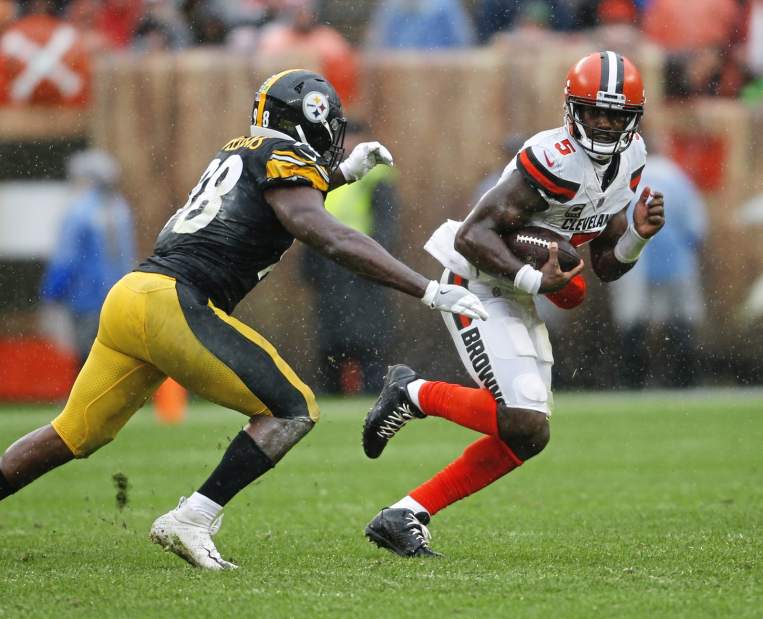Underdog mentality still motivates Steelers' Vince Williams
Vince Williams doesn’t know how his stall ended up in the far corner of the Pittsburgh Steelers locker room a few years back. It’s prime real estate: a coveted “corner lot,” close to an exit and away from the heavy foot traffic in those busy times after practice.
But to Williams, what made the positioning most fortuitous wasn’t the view of the whole room, nor the ability to stretch his legs onto a makeshift folding-chair ottoman.
“I was blessed by my locker position because I am by a guy like AB,” Williams said, referring of course to Antonio Brown, “and I was next to a guy like James Harrison. So all we ever talked about was all of us had similar paths finding success.”
Harrison went from an undrafted rookie to an All-Pro linebacker. Brown became a likely future Hall of Fame receiver from humble beginnings as a sixth-round pick.
Also a sixth-round pick, Williams isn’t quite on Brown’s Hall of Fame track. But he has come a long way as his career with the Steelers has evolved.
The 6-foot-1, 233-pound Williams has always been a well-respected and liked teammate, as well as a favorite of coach Mike Tomlin and his staff. But as recently as two years ago during his fourth NFL season, Williams’ role was that of core special-teams player and backup to Lawrence Timmons and Ryan Shazier.
Now, he’s the Steelers’ longest-tenured linebacker and has become an indispensible part of their defense. He calls out the signals, plays in all situations and almost never comes off the field.
Williams has missed just one of the Steelers’ 147 defensive snaps this season. Through two weeks, just three linebackers across the league played more.
“I never had to prove to anybody what my role was; I always knew what my role was on this team — now my role is just expanded,” Williams said.
“We all what I was capable of — we just had Ryan Shazier. If it’s who do you want on the field, Ryan or Vince, you’re picking Ryan.”
Now, it’s Williams who’s the centerpiece — literally and figuratively — of the Steelers linebackers corps.
“He’s in the prime of his career, I think, because he knows the game, he knows what we are doing, he knows where everybody is supposed to be, he knows all of that stuff,” defensive coordinator Keith Butler said. “So, if he knows all that and with the speed he’s got and the natural football ability he’s got, then he can accentuate that with his knowledge.”
Butler was Williams’ position coach when he was drafted out of Florida State in 2013. His status as a low-round pick didn’t preclude him from starting 11 games that season after an injury to veteran Larry Foote and when veteran replacement Kion Wilson was ineffective.
But the Steelers drafted the speedy Shazier a year later and paired him with an in-his-prime Lawrence Timmons to create a dynamic pair at inside linebacker. That left Williams as the odd man out; he started just six games between 2014-16.
Still, Tomlin and the Steelers’ brass liked him enough they gave him a contract extension the summer before his rookie deal was set to expire two years ago — a rarity for a non-starter. And when Timmons left in free agency in March 2017, Williams was promoted to starter.
But Shazier’s spinal injury in December, coupled with a premium $20.6 million, four-year contract last month, signifies Williams is now the man in the middle of the Steelers defense.
“He does everything they ask him to do,” said Jon Bostic, the Steelers’ junior starting inside linebacker. “He goes in there and makes plays and keeps making plays. He brings a unique skillset to the table and does different things for the defense. And, of course, he’s the guy we’re all looking to.”
For so long Williams used the I’m-a-sixth-round-pick, I-have-to-prove-everyone-wrong card as motivation. But now that he has everything he’s always wanted in regards to respect — a prominent role in the defense, a starter’s salary, the playcalling responsibility — what will drive Williams?
“The question with what I’m doing right now is, ‘Can I do it without Ryan?’ ” he answered, referring to Shazier. “I played with a superstar talent beside me — a lot of people felt like that contributed to my success.
“So now I am missing my brother, can I go out there and compete at a high level without him?”
Williams insists he hasn’t changed his game nor his persona now that he carries more unofficial titles associated with a unit leader.
“You don’t do things differently,” he said. “I just think that I have always kind of been myself. You don’t need to be exceptional…. Being a leader is just being yourself.”
True to form, don’t expect the big contract or prominent role to alter how Williams finds his motivation.
“You always still see the ‘Underrated Vince’ and the “Everybody is against Vince Vince,’ ” Heyward said.
“And that’s the way Vince wants it.”
Chris Adamski is a Tribune-Review staff writer. You can contact Chris at cadamski@tribweb.com or via Twitter @C_AdamskiTrib.

